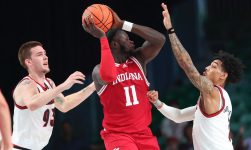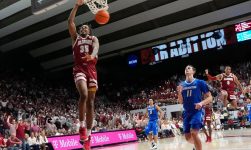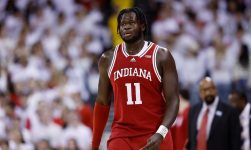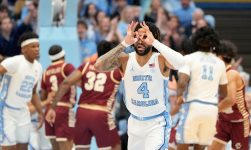When Tony Bennett arrived at Virginia for the 2009-10 season, 26 years had elapsed since the Cavaliers’ halcyon days of three straight No. 1 seeds in the NCAA Tournament under Terry Holland in the early 1980s.
Those Holland teams are forever synonymous with the playing career of all-time college basketball great Ralph Sampson, who is still the only player to win three straight Naismith Awards.
Bennett returned the Cavaliers to the bygone glory of that era. But he used a vastly different formula.
As Bennett’s run came to an abrupt end Thursday with his retirement less than three weeks before the start of the 2024-25 season, it’s hard to name one singular, iconic star from his stint with the team. He built a national-title winning program and dominant ACC force with just one NBA lottery pick over his 15-year run. He did it with suffocating defense and surgically efficient half-court offenses, which dissected opponents at an elite rate — particularly between 2013 and 2019.
The Cavaliers won four ACC regular-season titles and earned four No. 1 seeds in the NCAA Tournament during that six-year span, capped by the program’s first-ever title in 2019.
The preamble
Virginia failed to win an NCAA Tournament game during Bennett’s first four seasons and reached the Big Dance just once in that time. But he improved the Cavaliers’ win total in ACC play by two games each year leading up to the program’s breakout 2013-14 campaign, which was highlighted by a 30-7 record and Sweet 16 appearance.
While his success was not immediate, the preamble to Bennett’s UVA tenure offered plenty of clues about his potential. He took over at Washington State in 2006 when his father, Dick Bennett, retired from the WSU job in 2006.
Tony had been and assistant under his father for several seasons, first at Wisconsin and then Washington State after wrapping up his own playing career in the NBA and overseas. He guided the Cougars to their best NCAA Tournament seeds in program history in 2007 (No. 3) and 2008 (No. 4), earning Naismith Coach of the Year honors for his efforts in 2007.
Tony Bennett honed his signature coaching style during his time at Washington State.
Getty Images
The formula he used at Wazzou would soon make its way to the ACC as the Cougars played suffocating defense while operating with some of the slowest tempo in the sport.
Record at Washington State
YearRecordConference FinishPostseason Finish2006-0726-82ndRound of 322007-0826-93rdSweet 162008-0917-167thNIT First Round
The breakthrough team
The breakthrough 2013-14 Virginia team came with a familiar roster formula. Though it was the height of the one-and-done era marked by the national titles of freshman-oriented teams at Kentucky (2012) and Duke (2015), Virginia operated in a different world under Bennett.
The team was anchored by four-year program veterans Joe Harris and Malcolm Bogdon. Both have gone on to have fruitful NBA careers as second-round draft picks who outplayed modest recruiting rankings under Bennett’s tutelage. Bennett consistently identified players who fit his scheme and molded them into multi-year contributors while also maximizing their talents in a way that made them palatable — though perhaps not exceptional — NBA prospects.
The 2013-14 team also embodied the resilience that would come to define Bennett’s tenure. The Cavaliers lost back-to-back December games that season — scoring just 38 points against Wisconsin and falling on the road to Bennett’s alma mater Green Bay.
Add in a 87-52 drubbing at Tennessee and the Cavaliers were on tenuous footing and unranked when they entered entered ACC play.
But from there, they went 16-2 against ACC competition with the only losses coming by a combined 10 points on the road against Duke and Maryland. The Cavaliers swept through the ACC Tournament and secured two double-digit wins in the Big Dance before a heartbreaking loss against Michigan State in the Sweet 16.
The season established Cavaliers’ identity and proved Bennett’s, slow-paced and defense-oriented style could not only succeed in the NCAA Tournament, it could also make the Cavs a national power.
Building up to a title
Virginia spent the entire 2014-15 season in the top 10 of the AP poll as its defense reached historic levels of success. Rutgers, Harvard and Georgia Tech each failed to reach 30 points against the Cavaliers, who finished the season ranked No. 1 nationally in points allowed per game at 51.5.
It was the best scoring defense of Bennett’s tenure, which is saying a lot for a program that ranked No. 1 nationally in points per game seven times in eight years. The formula was clearly successful, but it wasn’t foolproof. When the Cavaliers went cold from beyond the arc in the first round of the 2018 NCAA Tournament, a historic outcome ensued.
YearRecordConference FinishPostseason Finish2009-1015-16T-9thN/A2010-1116-15T-7thN/A2011-1222-10T-4thRound of 642012-1323-12T-4thNIT Quarterfinal2013-1430-71stSweet 162014-1530-41stRound of 322015-1629-8T-2ndElite Eight2016-1723-11T-5thRound of 322017-1831-31stRound of 642018-1935-3T-1stChampion
No. 16 seed UMBC stunned Virginia 74-54 as the Retrievers became the first No. 16 seed in NCAA Tournament history to beat a No. 1 seed. It was a humiliating defeat for the Cavaliers that set the stage for an all-time great redemption story.
Bennett did not abandon the program’s defensive mantra in the wake of the shocking 2018 NCAA Tournament loss. But he did let his offense lean into its strength, which was 3-point shooting.
The 2018-19 Cavaliers attempted more 3-pointers per game (21.4) than any other team to that point in Bennett’s tenure. With 42.6% 3-point shooter Kyle Guy leading the way, UVA ranked No. 7 nationally in 3-point percentage at 39.5%. The result was 71.4 points per game, which was the most scored per game by any Virginia team before or since.
With a capable offense to pair with its typically salty defense, Virginia secured the ultimate measure of redemption and won the 2019 national title, securing Bennett’s legacy as one of the all-time great program builders.
Prior to his arrival, the Cavaliers were largely known for Sampson’s historic run in the 1980s. But Bennett ushered in a new golden era for the program and launched it to a heights that even the great Sampson could never reach.






